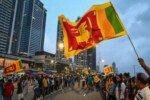COLOMBO, Feb 8 (PTI): President Ranil Wickremesinghe on Wednesday ruled out a “division” of Sri Lanka but promised to go ahead with the devolution of powers within a “Unitary State” and continue with his “politically unpopular” decisions to ensure that the bankrupt nation recovers from its worst economic crisis.
In a major policy address, Wickremesinghe also told Parliament that talks with the IMF to unlock a USD 2.9 billion bailout package are in the final stages.
“We expect to devolve power within a Unitary State. However, I wish to reiterate a fact that has been emphasised on many occasions. There will be no division of the country,” Wickremesinghe told lawmakers.
Wickremesinghe who had expressed willingness to fully implement the 13th Amendment to the Constitution – and found opposition to it from the powerful Buddhist clergy – made no mention of it.
“All previous attempts have failed, but we wish to succeed this time. We expect your support to this end,” he said.
He said the conflict in the North and East affected the entire nation and many areas were severely damaged. The Northern Province entirely and several areas in the Eastern and North Central Provinces suffered immensely from the war.
“We are taking steps to put more weight on the development of these areas. A general plan is being implemented in this regard,” he added.
His remarks came days after the powerful Buddhist clergy expressed strong opposition to the move, claiming it challenges the unitary nature of the country.
President Wickremesinghe has underlined the need to fully implement the 13th Amendment to the Constitution to grant political autonomy to the minority Tamils in the country.
India has been pressing Sri Lanka to implement the 13A which was brought in after the Indo-Sri Lankan agreement of 1987.
Sinhalese, mostly Buddhist, make up nearly 75 per cent of Sri Lanka’s 22 million population while Tamils are 15 per cent.
Talking about the economic crisis, Wickremesinghe said that Sri Lanka expects to recover from bankruptcy by 2026.
“Let’s not be prisoners of the past, but think about the future. Let’s unite consensually and move forward democratically to support the recovery of the nation from the current crisis,” he said.
He said unpopular decisions taken by him will have positive results in the years to come.
“Introducing new tax policies is a politically unpopular decision. Remember, I’m not here to be popular. I want to rebuild this nation from the crisis situation it has fallen. Yes, I’m ready to make unpopular decisions for the sake of the nation. People will realise the importance of those decisions in two to three years,” he said.
The Sri Lankan government has introduced painful economic measures such as tax hikes and utility rate hikes. Trade unions and opposition groups have organised protests against such measures.
Wickremesinghe insisted on why the tax reforms were needed to revive the bankrupt economy, even as several trade unions staged a protest here against the government’s plan. He lamented the political and trade union opposition to personal tax hikes envisaged.
The trade unions representing all state sectors including the doctors staged a day of protest. Doctors had launched a 24-hour work strike.
Wickremesinghe said the state would lose 63 billion unless the tax hikes were implemented. “We are presently not in a position to lose this income”.
The President said the country had moved from being a negative economy to a positive one. “By the end of 2023, we can achieve economic growth”.
He said the inflation which was 70 per cent when he took over as the president in July last year had now been reduced to 54 per cent in January.
However, the country would be in its current bankrupt state till 2026 unless there was all round support for the economic reforms.
Sri Lanka was hit by an unprecedented financial crisis in 2022, the worst since its independence from Britain in 1948, due to a severe paucity of foreign exchange reserves, sparking political turmoil in the country which led to the ouster of the all-powerful Rajapaksa family.







